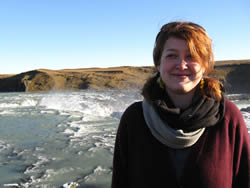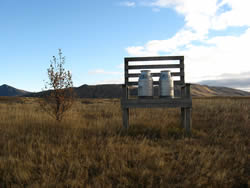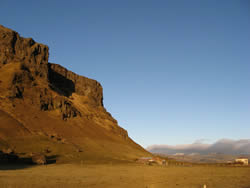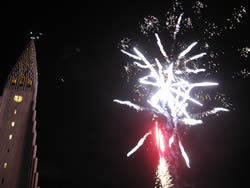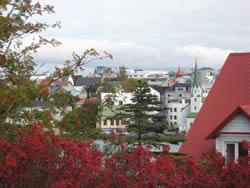- Home » Expat Articles » Interviews » Expat Interview With Larissa - US Expat in Iceland
Expat Interview With Larissa - US Expat in Iceland
| Published: | 13 Feb at 9 AM |
Want to get involved?
Become a Featured Expat and take our interview.
Become a Local Expert and contribute articles.
Get in touch today!
Become a Local Expert and contribute articles.
Get in touch today!
Filed: Interviews,Iceland
A native Arizonan turned New Yorker, Larissa Kyzer left her adopted home of Clinton Hill, Brooklyn in August 2012 and moved to Reykjavík to begin studying the Icelandic language at the University of Iceland. With time (and lots of hard work), she aims to become fluent enough in the language that she can translate contemporary Icelandic fiction into English. A freelance writer and librarian, Larissa hopes to one day divide her time between translating, writing, and working as a youth librarian. For the time being, she spends her free time haunting public libraries around Reykjavík, cooking, and blogging about expat life and language-learning at Eth & Thorn (won Expat Blog Awards 2012 Gold for Iceland! - see listing here)
Where are you originally from?
I was born and raised in Tucson, Arizona, but moved to New York City for college. I lived in New York for ten years (and was a proud resident of Clinton Hill, Brooklyn for six) before moving to Reykjavík in August 2012.
In which country and city are you living now?
Reykjavík, Iceland
How long have you lived here and how long are you planning to stay?
I’ve been here for just over four months now. It’s my hope to be here for at least two years, but there are a lot of variables which will determine whether or not that is possible, and maybe even whether I can stay longer.
Why did you move and what do you do?
I received a grant co-sponsored by the U.S. Fulbright Program and Icelandic Ministry of Culture and Education to study Icelandic at the University of Iceland in Reykjavík. One day--far in the future, of course--I hope to translate contemporary Icelandic literature into English.
Did you bring family with you?
My partner Mark moved with me and is now also a graduate student at the University of Iceland.
How did you find the transition to living in a foreign country?
Surreal, to be honest. Moving to Iceland is something that I had been planning for and incredibly excited about for a really long time, but arriving here and getting the basics settled--such as finding an apartment, finalizing all the visa paperwork, getting a library card and a cell phone, figuring out the bus system, finding the nearest grocery store, the whole nine yards--was a lot more draining than I expected. It was a bit of a blur at the beginning.
Now that I have been here for a little while and have had a chance to settle in a bit, I’m really enjoying the transition--noticing the small differences in attitudes and behaviors that you tend to take for granted when you’ve lived in a place for a long time.
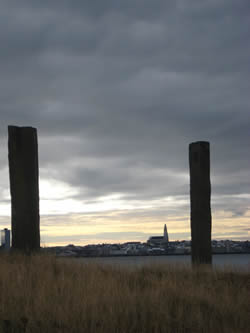
View of Reykjavík (and Hallgrímskirkja) from the West island of Viðey. The two basalt pillars in the foreground are part of Richard Serra's installation 'Áfangar,' ('Milestones') which 'frame' various landmarks and sites around the islanWas it easy making friends and meeting people; do you mainly socialise with other expats?
I think making friends is a process, and it definitely takes some time to meet people when you move somewhere without many prior connections. Contrary to what people might expect of Iceland, though, there is a large expat community here, with immigrants and expats from all over the world, and I necessarily meet a lot of other foreigners through my “Icelandic as a Second Language” classes at the university. Since my academic program is intended solely for foreigners and the other grantees I know are all American, the real challenge so far has been finding ways to meet Icelanders. This experience is definitely pushing me to be more social!
What are the best things to do in the area; anything to recommend to future expats?
Iceland is a great place to live if you are an outdoorsy sort of person--and even if you don’t describe yourself that way when you get here, I think the magnificence of the natural environment sucks everyone in pretty quickly. (That’s a dramatic word, but I really think it’s accurate.) Reykjavík is a great city--and there is a lot to do here--but I’d highly recommend that anyone moving here takes full advantage of any and all opportunities to get out into the countryside. No matter what direction you go in, you’ll find stunning landscapes, and for the most part, very few other people to share them with.
The weather in Iceland tends to be chilly (not freezing, actually, but still cold) and wet, and it’s very, very dark in the wintertime. I think this makes it particularly important to fight the urge to huddle inside all the time, particularly in the winter. Take every opportunity to get outside--Icelanders definitely don’t let bad weather stop them doing so. You’ll regularly see Icelanders jogging in reflective gear on a pitch-dark morning in the rain, and people go hiking throughout the winter, too. (You really should invest in good, water-proof clothing before you get here, for city and sport use. It will be really expensive here, but you’ll need it.)
This isn’t to say that you have to be an advanced mountain climber or spelunker to get out and enjoy yourself. I’m personally not ready to go jogging up a snowy mountain trail, but I really enjoy walking along the paved path by the ocean that runs along the shore behind my house. I also love going to the incredibly clean, geothermally-heated swimming pools all over Reykjavík. There’s nothing like swimming laps outdoors on a rainy, cold day with steam clouding over the whole pool, and then hustling over to the hot pot for a relaxing soak afterwards.
What do you enjoy most about living here?
People here are extremely creative, and extremely productive in their creativity. The music scene here is well-known, of course, but there is also a really active performance community (dance, theater, etc.), and--foremost for me--an incredibly dynamic literary culture. Icelanders are really receptive to new ideas and projects and generally very supportive of artistic endeavors--even if the artists are themselves very young or very new to the scene, which often, they are. It is an inspiring environment to be in--flourishing and inventive, but still rather open and democratic. You really feel like you can be a participant in this collective creativity, even if that just means working on your novel (or your blog) at home.
How does the cost of living compare to home?
Since my last home was New York City, the cost of living is pretty comparable, but in general, it is pretty expensive to live in Reykjavík. A lot of things--such as electronics--have to be imported after all, and what isn’t imported is often made by hand, or produced by a very small number of people. For instance, if you buy a lopapeysa (one of Iceland’s famous traditional sweaters), in most cases it will have been hand-knitted (the knitter’s name and hometown are often even listed on the price tag). In cases like this, it makes sense to me that it would cost more to buy a high quality handmade sweater than one that was mass produced.
It’s also worth noting that things that are not really necessary expenses, like restaurant dinners or alcohol, tend to be more expensive than things that you do absolutely need, like food from the grocery store. Groceries and such are generally very reasonable in cost, even if some staples (like produce) are being imported.
What negatives, if any, are there to living here?
The wind can be incredibly intense, and the winter very dark. And although there is a lot of great produce cultivated in greenhouses around Iceland, the selection of fresh vegetables in the grocery stores can be limited, especially in the winter. These aren’t deal-breakers in my mind at all, though, just aspects of daily life here that an expat like me needs to adjust to.
If you could pick one piece of advice to anyone moving here, what would it be?
Bring an ice cube tray! I know that sounds fatuous, but large cube ice trays are not really used here (they probably think it’s cold enough) and they are strangely one of the things I missed most upon my arrival.
On a more serious note, I’d just offer the general advice that like moving anywhere, moving to Iceland from a different country is difficult and takes some adjustment. There are two Icelandic sayings that I like to keep in mind when I’m having a trying day, though: þetta réddast, or, basically, “it will work out,” and áfram með smjörið, which literally means, “onwards with the butter,” but metaphorically just means “keep going!”
What has been the hardest aspect to your expat experience so far?
Currently, I’m in a bit of a purgatory--I haven’t quite moved here, but I’m not really an exchange student who is going to just go back home after nine months. So I don’t really have a permanent home right now, which feels strange to me. My stuff is in storage in New York, my mail goes to my parents in Arizona, and for the moment, at least, I’m living in Iceland.
When you finally return home, how do you think you'll cope with repatriation?
I imagine that we’ll go back to Brooklyn after Iceland and that there will be some relief to be back in not only a country, but a city that we are familiar with. It’ll be nice to live close to our friends again and not have to worry about visas and work permits. It’ll be nice to not be living a seven hour time difference away from my family, so that calling home doesn’t have to be as much of a planned event. It’ll be nice to have a transit system that runs all night and a lot of take-out options for when we’re feeling too lazy to cook.
But there are also a lot of aspects to my new lifestyle here in Iceland that I know already that I’ll miss. I’ll miss the pools, I’ll miss the closeness to really open, really unfettered nature. I’ll miss that feeling of openness that you have here in regards to creative participation--New York is full of millions of really creative people, but it is such a competitive and saturated atmosphere that for me, it can sometimes feel overwhelming instead of inspiring.
Another thing that I think it may be hard to get used to again is the New York social calendar. In New York, people tend to make a lot of social plans during the week, and also regularly spend a lot of that social time outside of their homes and in bars and other places. Here, people tend not to go out as much during the week and in general, spend a lot more time at home with their families and friends alike. I actually like having the balance shifted a bit more toward home life, and having the attendant consequences and benefits: cooking more, for one, and having time (at least theoretically) to read, work on your own creative projects, and just be in your own space.
What I hope that I can do is take the best parts of my Reykjavík mindset and lifestyle and maintain them in New York, or wherever I end up in the future.
What are your top 5 expat tips for anyone following in your footsteps?
Tell us a bit about your own expat blog.
I started my blog, Eth & Thorn, shortly before I first moved to Iceland, but after I knew that I had gotten my grant. (Eth and Thorn are the English names for two characters unique to the Icelandic alphabet.) On the blog, I not only write about the language learning process and wacky vocab and grammar rules that I pick up along the way, I also write about trips we’ve taken around the country, Icelandic cultural discoveries (food, holiday celebrations, the transit system--all sorts of things), and the whole expatriate experience for Mark and I thus far.
This is the first time I’ve kept such a regular, personal account of my daily doings, but it’s actually been a really helpful medium in which to organize my thoughts and reflect on things in the moment. It is also just a great way to share updates with people I know and other generous readers who happen to also be interested in Iceland, Icelandic, or living in a foreign country. So it feels like I’m having a conversation with other people, and not just scribbling to myself, which is extra motivation to keep writing on a regular basis.
How can you be contacted for further advice to future expats coming to your area?
Feel free to contact me via my blog.
Larissa blogs at http://ethandthorn.wordpress.com/ which we recommend a quick visit if you haven't been already. Eth & Thorn has an ExpatsBlog.com listing here so add a review if you like! If you appreciated this interview with Larissa, please also drop her a quick comment below.
Here's the interview with Larissa...
Where are you originally from?
I was born and raised in Tucson, Arizona, but moved to New York City for college. I lived in New York for ten years (and was a proud resident of Clinton Hill, Brooklyn for six) before moving to Reykjavík in August 2012.
In which country and city are you living now?
Reykjavík, Iceland
How long have you lived here and how long are you planning to stay?
I’ve been here for just over four months now. It’s my hope to be here for at least two years, but there are a lot of variables which will determine whether or not that is possible, and maybe even whether I can stay longer.
Why did you move and what do you do?
I received a grant co-sponsored by the U.S. Fulbright Program and Icelandic Ministry of Culture and Education to study Icelandic at the University of Iceland in Reykjavík. One day--far in the future, of course--I hope to translate contemporary Icelandic literature into English.
Did you bring family with you?
My partner Mark moved with me and is now also a graduate student at the University of Iceland.
How did you find the transition to living in a foreign country?
Surreal, to be honest. Moving to Iceland is something that I had been planning for and incredibly excited about for a really long time, but arriving here and getting the basics settled--such as finding an apartment, finalizing all the visa paperwork, getting a library card and a cell phone, figuring out the bus system, finding the nearest grocery store, the whole nine yards--was a lot more draining than I expected. It was a bit of a blur at the beginning.
Now that I have been here for a little while and have had a chance to settle in a bit, I’m really enjoying the transition--noticing the small differences in attitudes and behaviors that you tend to take for granted when you’ve lived in a place for a long time.

View of Reykjavík (and Hallgrímskirkja) from the West island of Viðey. The two basalt pillars in the foreground are part of Richard Serra's installation 'Áfangar,' ('Milestones') which 'frame' various landmarks and sites around the islan
I think making friends is a process, and it definitely takes some time to meet people when you move somewhere without many prior connections. Contrary to what people might expect of Iceland, though, there is a large expat community here, with immigrants and expats from all over the world, and I necessarily meet a lot of other foreigners through my “Icelandic as a Second Language” classes at the university. Since my academic program is intended solely for foreigners and the other grantees I know are all American, the real challenge so far has been finding ways to meet Icelanders. This experience is definitely pushing me to be more social!
What are the best things to do in the area; anything to recommend to future expats?
Iceland is a great place to live if you are an outdoorsy sort of person--and even if you don’t describe yourself that way when you get here, I think the magnificence of the natural environment sucks everyone in pretty quickly. (That’s a dramatic word, but I really think it’s accurate.) Reykjavík is a great city--and there is a lot to do here--but I’d highly recommend that anyone moving here takes full advantage of any and all opportunities to get out into the countryside. No matter what direction you go in, you’ll find stunning landscapes, and for the most part, very few other people to share them with.
The weather in Iceland tends to be chilly (not freezing, actually, but still cold) and wet, and it’s very, very dark in the wintertime. I think this makes it particularly important to fight the urge to huddle inside all the time, particularly in the winter. Take every opportunity to get outside--Icelanders definitely don’t let bad weather stop them doing so. You’ll regularly see Icelanders jogging in reflective gear on a pitch-dark morning in the rain, and people go hiking throughout the winter, too. (You really should invest in good, water-proof clothing before you get here, for city and sport use. It will be really expensive here, but you’ll need it.)
This isn’t to say that you have to be an advanced mountain climber or spelunker to get out and enjoy yourself. I’m personally not ready to go jogging up a snowy mountain trail, but I really enjoy walking along the paved path by the ocean that runs along the shore behind my house. I also love going to the incredibly clean, geothermally-heated swimming pools all over Reykjavík. There’s nothing like swimming laps outdoors on a rainy, cold day with steam clouding over the whole pool, and then hustling over to the hot pot for a relaxing soak afterwards.
What do you enjoy most about living here?
People here are extremely creative, and extremely productive in their creativity. The music scene here is well-known, of course, but there is also a really active performance community (dance, theater, etc.), and--foremost for me--an incredibly dynamic literary culture. Icelanders are really receptive to new ideas and projects and generally very supportive of artistic endeavors--even if the artists are themselves very young or very new to the scene, which often, they are. It is an inspiring environment to be in--flourishing and inventive, but still rather open and democratic. You really feel like you can be a participant in this collective creativity, even if that just means working on your novel (or your blog) at home.
How does the cost of living compare to home?
Since my last home was New York City, the cost of living is pretty comparable, but in general, it is pretty expensive to live in Reykjavík. A lot of things--such as electronics--have to be imported after all, and what isn’t imported is often made by hand, or produced by a very small number of people. For instance, if you buy a lopapeysa (one of Iceland’s famous traditional sweaters), in most cases it will have been hand-knitted (the knitter’s name and hometown are often even listed on the price tag). In cases like this, it makes sense to me that it would cost more to buy a high quality handmade sweater than one that was mass produced.
It’s also worth noting that things that are not really necessary expenses, like restaurant dinners or alcohol, tend to be more expensive than things that you do absolutely need, like food from the grocery store. Groceries and such are generally very reasonable in cost, even if some staples (like produce) are being imported.
What negatives, if any, are there to living here?
The wind can be incredibly intense, and the winter very dark. And although there is a lot of great produce cultivated in greenhouses around Iceland, the selection of fresh vegetables in the grocery stores can be limited, especially in the winter. These aren’t deal-breakers in my mind at all, though, just aspects of daily life here that an expat like me needs to adjust to.
If you could pick one piece of advice to anyone moving here, what would it be?
Bring an ice cube tray! I know that sounds fatuous, but large cube ice trays are not really used here (they probably think it’s cold enough) and they are strangely one of the things I missed most upon my arrival.
On a more serious note, I’d just offer the general advice that like moving anywhere, moving to Iceland from a different country is difficult and takes some adjustment. There are two Icelandic sayings that I like to keep in mind when I’m having a trying day, though: þetta réddast, or, basically, “it will work out,” and áfram með smjörið, which literally means, “onwards with the butter,” but metaphorically just means “keep going!”
What has been the hardest aspect to your expat experience so far?
Currently, I’m in a bit of a purgatory--I haven’t quite moved here, but I’m not really an exchange student who is going to just go back home after nine months. So I don’t really have a permanent home right now, which feels strange to me. My stuff is in storage in New York, my mail goes to my parents in Arizona, and for the moment, at least, I’m living in Iceland.
When you finally return home, how do you think you'll cope with repatriation?
I imagine that we’ll go back to Brooklyn after Iceland and that there will be some relief to be back in not only a country, but a city that we are familiar with. It’ll be nice to live close to our friends again and not have to worry about visas and work permits. It’ll be nice to not be living a seven hour time difference away from my family, so that calling home doesn’t have to be as much of a planned event. It’ll be nice to have a transit system that runs all night and a lot of take-out options for when we’re feeling too lazy to cook.
But there are also a lot of aspects to my new lifestyle here in Iceland that I know already that I’ll miss. I’ll miss the pools, I’ll miss the closeness to really open, really unfettered nature. I’ll miss that feeling of openness that you have here in regards to creative participation--New York is full of millions of really creative people, but it is such a competitive and saturated atmosphere that for me, it can sometimes feel overwhelming instead of inspiring.
Another thing that I think it may be hard to get used to again is the New York social calendar. In New York, people tend to make a lot of social plans during the week, and also regularly spend a lot of that social time outside of their homes and in bars and other places. Here, people tend not to go out as much during the week and in general, spend a lot more time at home with their families and friends alike. I actually like having the balance shifted a bit more toward home life, and having the attendant consequences and benefits: cooking more, for one, and having time (at least theoretically) to read, work on your own creative projects, and just be in your own space.
What I hope that I can do is take the best parts of my Reykjavík mindset and lifestyle and maintain them in New York, or wherever I end up in the future.
What are your top 5 expat tips for anyone following in your footsteps?
- Forget lying about your birthday: if you’re one of those people who likes to fudge your age, be forewarned. Your Icelandic national ID, or kennitala, begins with the day, month, and year of your birthday, and you will be expected to recite it to everyone, everywhere, for pretty much everything. Get a library card, give your kennitala. Sign up for a cell phone plan, give your kennitala. Rent a video, give your kennitala. Unlike the American social security number, it is intended to be a very public number.
- Learn to plan ahead: grocery stores close early in the evening, pretty much everything is closed for days over holidays, the weather will go from mild and clear to frozen sleet in a blink. Learn to prepare for contingencies.
- Get used to making telephone calls again: Icelanders love gadgets (fancy cell phones and what-have-you), but people really do still expect to communicate a lot by phone. It feels strange to me, after working at a large university for a long time and doing the majority of my communicating via email, to pick up the phone and call people when I have a question about a telephone bill or want to inquire about an item for sale in a newspaper ad. But often, the only contact information you’ll get is someone’s phone number. It’ll be faster anyway.
- Forget paying with cash. No one uses it here. You can honestly use your debit card or credit card to pay for pretty much everything--even just a cup of coffee--and people often prefer that you do because it is faster. I’ve only ever encountered a “minimum” charge once, and that was when I tried to buy a cup of skyr at Hlemmur bus station with a card. The skyr cost 125 kronur (less than $1.50), so that seemed fair to me.
- Once you’ve gotten used to paying with a card, you can make the leap to paying all your bills directly from your bank account. Many companies won’t send you a paper bill unless you are elderly and specifically request it. Instead, they send the bill to your electronic bank account, and you can pay the bill via electronic transfer. You’ll notice that a lot of other payments are conducted via electronic transfer, too--salaries, deposits for vacation rentals, etc.
Lastly, there’s that old classic: always bring a towel! You’ll find that people go to the pools a lot--if only to chat in the hot pots (the geothermal jacuzzis that are at every pool)--and even though you can rent a towel (and a suit for that matter), you’ll save a fair amount of money in the long run if you bring your own. Plus, if you carry your swim things with you, you’ll be ready at a moment’s notice for a trip down the water slide, or a gossip session or football debate in the hot pots.
Tell us a bit about your own expat blog.
I started my blog, Eth & Thorn, shortly before I first moved to Iceland, but after I knew that I had gotten my grant. (Eth and Thorn are the English names for two characters unique to the Icelandic alphabet.) On the blog, I not only write about the language learning process and wacky vocab and grammar rules that I pick up along the way, I also write about trips we’ve taken around the country, Icelandic cultural discoveries (food, holiday celebrations, the transit system--all sorts of things), and the whole expatriate experience for Mark and I thus far.
This is the first time I’ve kept such a regular, personal account of my daily doings, but it’s actually been a really helpful medium in which to organize my thoughts and reflect on things in the moment. It is also just a great way to share updates with people I know and other generous readers who happen to also be interested in Iceland, Icelandic, or living in a foreign country. So it feels like I’m having a conversation with other people, and not just scribbling to myself, which is extra motivation to keep writing on a regular basis.
How can you be contacted for further advice to future expats coming to your area?
Feel free to contact me via my blog.
Larissa blogs at http://ethandthorn.wordpress.com/ which we recommend a quick visit if you haven't been already. Eth & Thorn has an ExpatsBlog.com listing here so add a review if you like! If you appreciated this interview with Larissa, please also drop her a quick comment below.
Grab a featured expat badge that links to this interview!
 Copy and paste code to display the Featured Expat Badge:
Copy and paste code to display the Featured Expat Badge:Comments » No published comments just yet for this article...
Feel free to have your say on this item. Go on... be the first!
